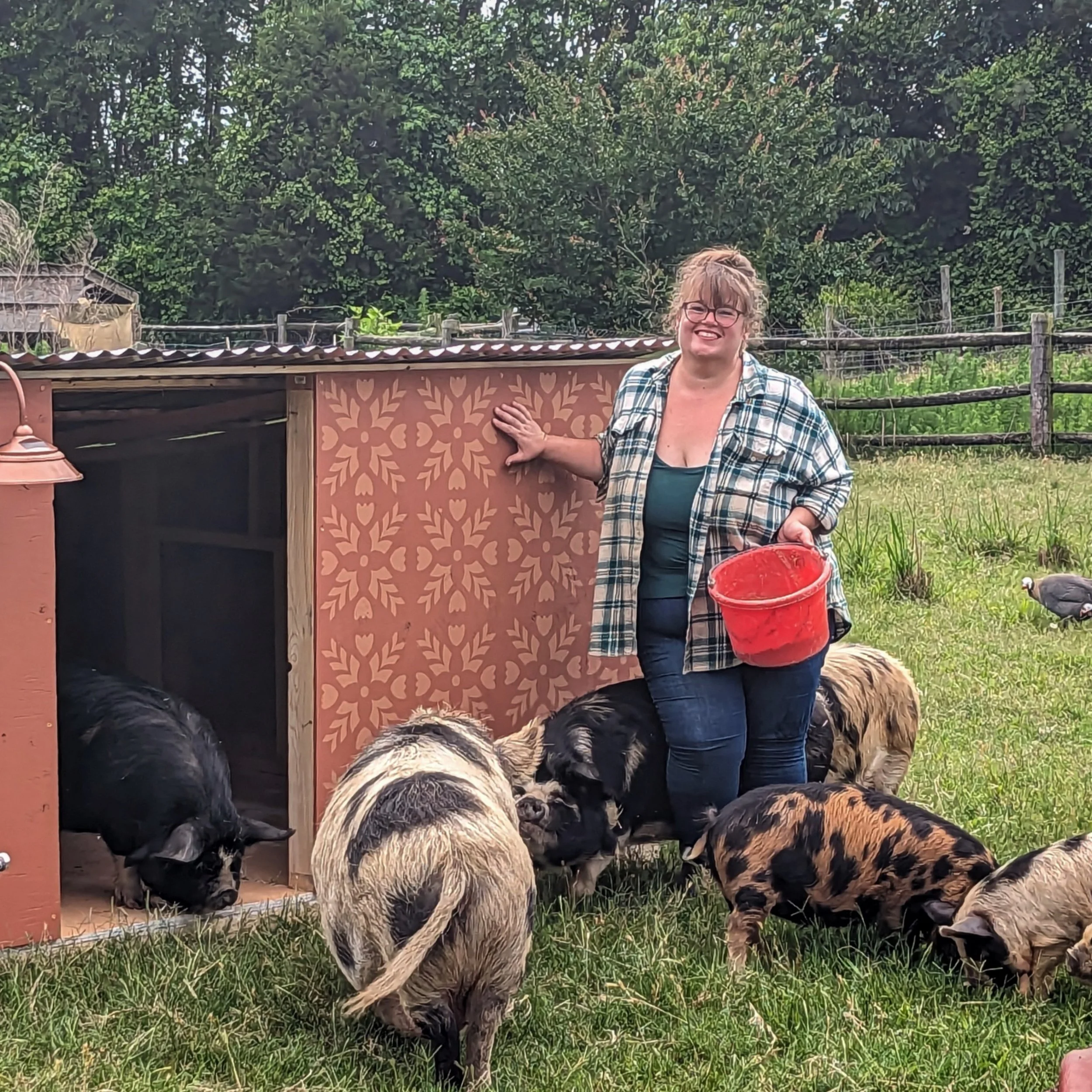At Slow Farm, we're on a mission to restore a 150-year-old former tobacco farm in Moore County, North Carolina. As a private regenerative farm, we embrace holistic and historic techniques, working from the soil up, microbe by microbe. There are no chemicals or shortcuts here—just the patient, natural processes that rebuild vitality.
To aid our land regeneration, we've assembled a team of wonderful livestock: brush goats, Kunekune pigs, and a lively group of free-range poultry. Each animal, and every breed, is thoughtfully chosen for the unique abilities they contribute to the land. Our Kunekune pigs are a standout example. Their moderate size, gentle nature, and short snouts allow them to clear pastures efficiently without disturbing the delicate mycelial networks in our silty soil. We see this breed as a potential game-changer for anyone interested in sustainable pork and responsible land stewardship. Learn more here.
Thank You
Supporters!
We're so grateful for the community that has built around Slow Farm. Your enthusiasm for what we do – from our regenerative farming practices to our handcrafted goods – fuels our drive for this work. Every high five, hug, and purchase has helped us grow and continue our mission of nurturing the land and creating products that celebrate what sustainability can be.
Why Your Support Matters
Farming the slow way, respecting the land, and crafting products with intention is deeply rewarding, but it's also a journey with unique challenges. As a small, independent farm, we invest deeply in sustainable practices, ethical sourcing, and the well-being of our animals and ecosystem. Your support helps us:
Continue Regenerative Practices: Invest in soil health, biodiversity, and carbon sequestration efforts that heal the land.
Care for Our Animals: Ensure the highest welfare standards for our happy, healthy farm inhabitants.
Educate Our Community: Share knowledge about sustainable living, native plants, and the importance of a holistic approach to wellness.
How You Can Help
If you feel called to contribute, your donation, no matter the size, makes a tangible difference in our ability to continue this vital work. It's an investment in a healthier planet, a more conscious approach to consumption, and a thriving local farm.
Ready to support Slow Farm? You can make a secure donation directly through our website. Simply click the button below:

The Slow Farmers:
Rachel Herrick
& Carl Dyke
Rachel Herrick and Carl Dyke have called North Carolina home for over two decades, though Rachel originally hails from Maine and Carl from Pennsylvania.
Rachel Herrick comes from a three-generation farming lineage. She grew up on a traditional diversified farm in central Maine, where her family raised beef, pork, poultry, apples, and vegetables. While not organic or sustainable in its methods, the farm instilled in her a strong work ethic.
One of seven siblings, Rachel is the only one who returned to farming. Growing up in the 80s, small-scale farming was often seen as a dead end, and her parents encouraged their children to pursue higher education and more profitable careers. Consequently, Rachel earned a Bachelor's degree in Writing and later a Master's of Fine Art in Contemporary Art. She leveraged the creativity, resourcefulness, and drive cultivated on the farm to build a successful career as an artist, writer, and educator.
In turn, her experiences in the arts allowed her to return to farming with fresh eyes in 2015 after a decade teaching and exhibiting her work in galleries and museums worldwide. She credits her creative background with setting her free from conventions and letting her explore new approaches to the questions surrounding sustainable living.
Rachel has operated Slow Farm as her full time career since 2019.
Carl Dyke
Carl Dyke is a history professor at Methodist University in Fayetteville, NC. Raised in rural Bucks County, Pennsylvania, by a father interested in biodynamics and conservation, Carl developed many of the hands-on and theoretical skills he uses on the farm today, including carpentry, gardening, and the foundations of permaculture. He manages Slow Farm projects around his full-time teaching schedule.
Carl's academic expertise lies in complexity theory and systems, interdisciplinary research, and postmodern European intellectual history (aka whhat people used to think, why, and what happened as a result). This background in complex environmental systems provides a valuable balance of intellectual depth and practical skills, which he has impressively expanded and honed during his decade as a farmer.



